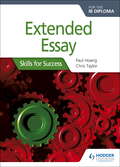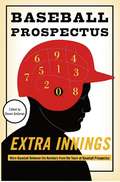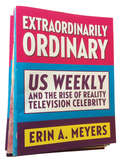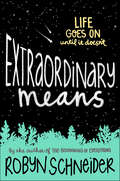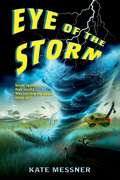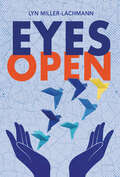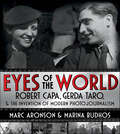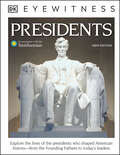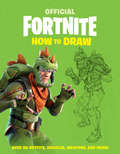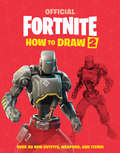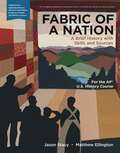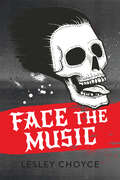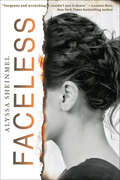- Table View
- List View
Exposure: A Virals Novel (Virals # #4)
by Kathy Reichs Brendan Reichs"If you like the TV show Bones (I do) or Maximum Ride, you'll love Virals."--James Patterson Another thrilling Virals adventure from New York Times bestsellers Kathy and Brendan Reichs.<P><P> When twin classmates are abducted from Bolton Prep, Tory and the Virals decide there's no one better equipped than them to investigate. But the gang has other problems to face. Their powers are growing wilder, and becoming harder to control. Chance Claybourne is investigating the disastrous medical experiment that twisted their DNA. <P> The bonds that unite them are weakening, threatening the future of the pack itself.The Virals must decipher the clues and track down a ruthless criminal before he strikes again, all while protecting their secret from prying eyes. And everyone seems to be watching.
Extended Essay for the IB Diploma: Skills for Success
by Chris Taylor Paul HoangBuild confidence in a range of key essay writing techniques and skills with this practical companion, full of advice and guidance from experienced EE experts.· Build essay writing techniques and skills through a range of strategies, serving as a useful companion throughout the writing process - from the development of a research question, critical-thinking, referencing and citation to reflecting on the process and final essay· Concise, clear explanations help you navigate the IB requirements, including advice on assessment objectives and academic honesty· Learn what is required to get the best EE grades and write an excellent essay with detailed examiner advice and expert tips and hints, including common mistakes to avoid · Explicit reference to the IB Learner profile and the importance of reflection. Paul Hoang is Vice Principal at Sha Tin College, English Schools Foundation in Hong Kong. He writes for Business Review, published by Philip Allan. He is a member of the editorial board for IB Review, Philip Allan's flagship publication for the IB. Paul is the author of several publications including Economics for the IB Diploma Revision Guide (Hodder Education), IB Business Management, 3rd edn (IBID Press), IGCSE Business Studies for Edexcel (Anforme), and Cambridge IGCSE and O Level Economics (Hodder Education). He is an IB examiner and has over 10 years of experience as an IB Workshop Leader.Chris Taylor is Extended Essay Coordinator at Sha Tin College - an international school and IB World School with over 1200 students. He teaches IB History and has examined the EE component of the Diploma for over 10 years. Chris authored Riding the Dragon (2013), a book that details his visits to every province in China and the culture, history and people in each of these. He is a regular contributing author of IB Review magazine, specialising in IB History and the Extended Essay. Having visited many countries, Chris is also a travel writer for the South China Morning Post, Hong Kong's leading English language newspaper.
Extra Innings: More Baseball Between the Numbers from the Team at Baseball Prospectus
by Steven Goldman The Baseball ProspectusIn 1996, a brassy young team of fans produced a guide to baseball statistics. Printed on a photocopier, its distribution, which was in the low hundreds, was limited to friends, family, and die-hard stat heads. Sixteen years later, the Baseball Prospectus annual regularly hits best-seller lists and has become an indispensable guide for the serious fan. In Extra Innings, the team at Baseball Prospectus integrates statistics, interviews, and analysis to deliver twenty arguments about today's game. In the tradition of their seminal book, Baseball Between the Numbers, they take on everything from steroids to the amateur draft. They probe the impact of managers on the game. They explain the critical art of building a bullpen. In an era when statistics matter more than ever, Extra Innings is an essential volume for every baseball fan.
Extraordinarily Ordinary: Us Weekly and the Rise of Reality Television Celebrity
by Erin A. MeyersExtraordinarily Ordinary offers a critical analysis of the production of a distinct form of twenty-first century celebrity constructed through the exploding coverage of reality television cast members in Us Weekly magazine. Erin A. Meyers connects the economic and industrial forces that helped propel Us Weekly to the top of the celebrity gossip market in the early 2000s with the ways in which reality television cast members fit neatly into the social and cultural norms that shaped the successful gossip formulas of the magazine. Us Weekly’s construction of the “extraordinarily ordinary” celebrity within its gossip narratives is a significant symptom of the broader intensification of discourses of ordinariness and the private in the production of contemporary celebrity, in which fame is paradoxically grounded in “just being yourself” while simultaneously defining what the “right” sort of self is in contemporary culture.
Extraordinary Means
by Robyn SchneiderJohn Green's The Fault in Our Stars meets Rainbow Rowell's Eleanor & Park in this darkly funny novel from the critically acclaimed author of The Beginning of Everything.Up until his diagnosis, Lane lived a fairly predictable life. But when he finds himself at a tuberculosis sanatorium called Latham House, he discovers an insular world with paradoxical rules, med sensors, and an eccentric yet utterly compelling confidante named Sadie—and life as Lane knows it will never be the same.Robyn Schneider's Extraordinary Means is a heart-wrenching yet ultimately hopeful story about the miracles of first love and second chances.
Extras (Uglies #4)
by Scott WesterfeldThe final installment of Scott Westerfeld&’s New York Times bestselling and award-winning Uglies series—a global phenomenon that started the dystopian trend.A few years after rebel Tally Youngblood takes down the Specials regime, a cultural renaissance sweeps the world. &“Tech-heads&” flaunt their latest gadgets, &“kickers&” spread gossip and trends, and &“surge monkeys&” are hooked on extreme plastic surgery. Popularity rules, and everyone craves fame. Fifteen-year-old Aya Fuse is no exception. But Aya&’s face rank is so low, she&’s a total nobody. An extra. Her only chance at stardom is to kick a wild and unexpected story. Then she stumbles upon a big secret. Aya knows she is on the cusp of celebrity. But the information she is about to disclose will change both her fate…and that of the brave new world.
Extreme Longevity: Discovering Earth's Oldest Organisms
by Karen Latchana KenneyMeet the science experts who study specimens of extreme longevity in both the plant and animal kingdoms, such as the 80,000-year-old root system of Pando (a colony of male quaking aspens), 11,000-year-old deep-sea sponges, and 400-year-old sharks. Learn about technologies used to determine age and longevity, including DNA sampling, growth rings, and radiocarbon dating. See how scientists located these long-lived species were and why and how they resist disease and aging. And delve into how scientists are using what they know about aged plants and animals to research how we can promote longevity in humans.
Eye of the Storm
by Kate MessnerIn the not-too-distant future, huge tornadoes and monster storms are a part of everyday life. In the heart of storm country, Jaden Meggs attends the exclusive summer science camp, Eye on Tomorrow that her dad founded. There she meets Alex, a boy from a nearby storm-ravaged farm, and together they discover a horrible truth about her dad's weather research. As a massive tornado approaches, Jaden must trust her knowledge and have faith in herself to confront her dad and save everyone from the biggest storm yet.
Eyes Like Stars (Theatre Illuminata)
by Lisa MantchevThe fantastic first novel in Lisa Mantchev's Theatre Illuminata trilogyWelcome to the Théâtre Illuminata, where the characters of every play ever written can be found behind the curtain. The actors are bound to the Théâtre by The Book, an ancient and magical tome of scripts. Bertie is not one of the actors, but they are her family. And she is about to lose them all because The Book has been threatened, and along with it the Théâtre. It's the only home Bertie has ever known, and she has to find a way to save it. But first, there's the small problem of two handsome men, both vying for her attention. Nate, a dashing pirate who will do anything to protect Bertie, and Ariel, a seductive air spirit. The course of true love never did run smooth. . . .With Eyes LIke Stars, Lisa Mantchev has written a debut novel that is dramatic, romantic, and witty, with an irresistible and irreverent cast of characters who are sure to enchant the audience.
Eyes Open
by Lyn Miller-LachmannPortugal, 1967. Sónia thinks she knows what her future holds. She’ll become a poet, and together she and her artist boyfriend, Zé Miguel, will rise above the government restrictions that shape their lives. The restrictions on what Sónia can do and where she can go without a man’s permission. The restrictions on what music she can enjoy, what books she can read, what questions she can ask. But when Zé Miguel is arrested for anti-government activities and Sónia’s family’s restaurant is shut down, Sónia’s plans are upended. No longer part of the comfortable middle class, she’s forced to leave school and take a low-paying, grueling, dangerous job. She thought she understood the dark sides of her world, but now she sees suffering she never imagined. Without the protection of her boyfriend or her family, can Sónia find a way to fight for justice? This poignant novel in verse follows a teen girl discovering how to resist tyranny and be true to herself.
Eyes of the World: Robert Capa, Gerda Taro, & the Invention of Modern Photojournalism
by Marc Aronson Marina Budhos“If your pictures aren’t good enough, you aren’t close enough.” –Robert CapaRobert Capa and Gerda Taro were young Jewish refugees, idealistic and in love. As photographers in the 1930s, they set off to capture their generation's most important struggle—the fight against fascism. Among the first to depict modern warfare, Capa, Taro, and their friend Chim took powerful photographs of the Spanish Civil War that went straight from the action to news magazines. They brought a human face to war with their iconic shots of a loving couple resting, a wary orphan, and, always, more and more refugees—people driven from their homes by bombs, guns, and planes.Today, our screens are flooded with images from around the world. But Capa and Taro were pioneers, bringing home the crises and dramas of their time—and helping give birth to the idea of bearing witness through technology.With a cast of characters ranging from Langston Hughes and George Orwell to Pablo Picasso and Ernest Hemingway, and packed with dramatic photos, posters, and cinematic magazine layouts, here is Capa and Taro’s riveting, tragic, and ultimately inspiring story.This thoroughly-researched and documented book can be worked into multiple aspects of the common core curriculum.
Eyewitness Presidents (DK Eyewitness)
by DKAn informative and visual guide to America's highest office, this DK Eyewitness book explores the history of the White House and the presidents who have served in it.Written in association with the Smithsonian Institution, this beautiful visual reference book provides mini-biographies and trivia for budding historians, along with hundreds of photos that illustrate the lives of Presidents that shaped American history.Students and teachers alike will find intriguing facts in this comprehensive history book. Each president's feature starts with their early lives and takes the reader through their political careers. Discover how they came into office and what happened after they won their presidential elections. Be an eyewitness to the history of the inhabitants of the White House through full-color photographs of famous paintings, campaign memorabilia, handwritten letters, and even historical artifacts belonging to each President.As the first person to be called the President of the United States, George Washington helped unite the colonies and win independence from King George of Great Britain. Learn about his revolutionary leadership and the forging of the Constitution. Discover how Abraham Lincoln saved the Union from the American Civil War, and how Thomas Jefferson doubled the size of the nation with the Louisiana Purchase.The book includes a section of presidential speeches such as John F. Kennedy&’s inaugural address and Ronald Reagan's Evil Empire speech. Read about other 20th century presidents such George W. Bush, Bill Clinton, and the first Black president Barack Obama. This new edition introduces America&’s newest Commander-in-chief Joe Biden.The History of the US Presidents From George Washington to Joe BidenDK Eyewitness Books: Presidents uses a unique integrated format with text and pictures to give insight into the lives of the men that have held the highest position in the USA. Eyewitness educational books are a favorite for school-aged students, parents, and teachers alike.Inside this fascinating visual reference book: • Includes a feature on every American President in history - right up to Joe Biden • Presidential facts and trivia in bite-sized information that is easy to follow for younger readers • Hundreds of photos of famous artworks, historical artifacts, and handwritten letters • Includes a section on some of history's famous American political speeches More from DK Books:For more interesting facts about American Presidents look for DK Books The Presidents Visual Encyclopedia. If you enjoy DK Eyewitness Books: Presidents there are over 170 Eyewitness titles to choose from, covering a large variety of topics. For more history reference books DK Eyewitness: Victorians, DK Eyewitness: Aztec, and DK Eyewitness: World War I - just a few of the titles available.
FORTNITE (Official Fortnite Books)
by Epic GamesDraw your favorite Outfits, vehicles, weapons, and more with Epic Games' first official how to draw book, including tips to make your sketches as epic as your in-game achievements and featuring the authentic Fortnite holographic seal.Learn how to draw 35 of the game's most popular icons-including Outfits, weapons, building materials, and vehicles. In easy-to-follow stages, you'll go step-by-step from rough sketch to detailed finish.INCLUDES:16 iconic Outfits8 fearsome weaponsThe craziest in-game vehiclesDrawing guideTop art tips, including advanced shading and texture techniquesWhether you're a complete novice or an experienced artist, this book will inspire you to pick up a pencil and get sketching! LET'S GO!
FORTNITE (Official Fortnite Books)
by Epic GamesCelebrate all the wildest highlights from Fortnite's latest seasons in this official Epic Games' book, featuring the authentic Fortnite holographic seal.Fortnite has seen another year of incredible changes, starting with a huge asteroid blowing up the map to mark the launch of Chapter 2! Now you can follow all the twists and turns of the last 12 months--including the first Fortnite World Cup--in this official yearbook from Epic Games. Relive your favorite moments from Battle Royale and test your knowledge of seasons past!
FORTNITE (Official Fortnite Books)
by Epic GamesGrab your pencil and get ready to draw more of your favorite Outfits, back bling, and weapons with Epic Games' second official how to draw book! This all-new collection includes step-by-step instructions and expert tips to make your sketches as epic as your in-game achievements and features the authentic Fortnite holographic seal.In this legendary guide, learn to draw over 30 more of the game's most popular icons--from the best Outfits to the most-envied back bling and gliders. You'll go step-by-step with easy-to-follow instructions from rough sketch to detailed finish.INCLUDES:18 classic Outfits5 awesome weaponsThe most iconic back bling and glidersDrawing guideExpert art tips, including how to draw figures and perspectiveYOU TOO can create drawings that will inspire fear in your enemies.
FORTNITE (Official): The Ultimate Trivia Book
by Epic GamesAre you a true Fortnite expert? Find out in this official Epic Games trivia book, featuring the authentic Fortnite holographic seal.Packed with hundreds of quiz questions in five different levels of difficulty, this official trivia book from Epic Games is jam-packed with Battle Royale brainteasers to test your Fortnite expertise. Whether you're new to the game or an old hand, these questions will level up your knowledge and provide hours of fun. Are you up for the challenge? Your trivia test starts here!
FORTNITE: All the Best Moments from Battle Royale (Official Fortnite Books)
by Epic GamesCelebrate the evolution of Fortnite and all the best moments from seasons one through nine in this official Epic Games' book, featuring the authentic Fortnite holographic seal. Love Fortnite? Relive your favorite Fortnite memories here. Ever since it burst onto our screens in 2017, Fortnite has been in a state of constant change. This official, collectable guide features all the most exciting highlights from seasons one through nine including the volcano eruption, pirate invasions, the Cube, the Ice King, and so much more. Read on to revisit Battle Royale's most momentous moments! p.p1 {margin: 0.0px 0.0px 0.0px 0.0px; font: 27.5px Helvetica; color: #9952a0} p.p2 {margin: 0.0px 0.0px 0.0px 0.0px; font: 11.0px Helvetica}
FORTNITE: Battle Royale Survival Guide (Official Fortnite Bks.)
by Epic GamesThe OFFICIAL Battle Royale Survival Guide from Epic Games, the creators of FORTNITE, the BIGGEST gaming brand in the world. This full-color handbook includes all the top tips and tricks you'll need to dominate Battle Royale! From basic gameplay to more advanced maneuvers, this handbook lists all the essential tips and tricks you need to become the last player standing. Immerse yourself in island walk-throughs, weapon rundowns, combat hacks, building guides, team tactics, and more. Featuring: FULL ISLAND GUIDEAll the key places to land and loot--and how to get around the island with ease. SNEAKY SURVIVAL TACTICSSmart ways to use the Storm to your benefit, top tips for building your way out of trouble, and the outfit options that offer the best camouflage. HOW TO FIGHT BETTER AND SMARTERCrazy and creative ideas for using game elements to your advantage, whether playing solo or in a team.
FORTNITE: Collectors' Edition (Official Fortnite Books)
by Epic GamesFrom the fun to the fearsome, discover the best Outfits in the ONLY official collectors' guide from Epic Games, including exclusive concept art and insights from legendary gamers and featuring the authentic Fortnite holographic seal.What do you have in your locker? Keep track of your Outfits and find new favorites in the only official collectors' guide from Epic Games! You'll be able to:KEEP TRACK OF YOUR FAVORITES: Look back on Fortnite's most popular Outfits and make note of the rare ones you might have missed in the first seven seasons!PEEK BEHIND THE SCENES: Learn the stories behind your favorite Outfits and admire Epic's exclusive concept art!HEAR FROM THE LEGENDS THEMSELVES: Find out what well-known gamers think of your favorite Outfits.BE COOL AND CUSTOMIZE: Discover all of the contrails, gliders, harvesting tools, and back bling you need to complete your look!Whether you choose to be Wild Card or Whiplash, Beef Boss or Burnout, your look says a lot about you--so take one last look in the mirror and LET'S GO!
FORTNITE: The Visual Encyclopedia (Official Fortnite Books)
by Epic GamesThis is the essential resource Fortnite fans have been waiting for--the definitive guide to Fortnite Chapter One, featuring the authentic Fortnite holographic seal.The Ultimate Locker features all your favorite Outfits, pets, back bling, harvesting tools, gliders, contrails, and emotes from Seasons 1 to X, jam-packed into a single book and brought to you exclusively by Epic Games. Arranged season by season and including rarity values, set information, and fun facts throughout, this is a must-have reference for all Fortnite fans.
Fable for the End of the World
by Ava ReidThe Last of Us meets The Ballad of Songbirds and Snakes in this stand-alone dystopian romance about survival, sacrifice, and love that risks everything. By encouraging massive accumulations of debt from its underclass, a single corporation, Caerus, controls all aspects of society.Inesa lives with her brother in a half-sunken town where they scrape by running a taxidermy shop. Unbeknownst to Inesa, their cruel and indolent mother has accrued an enormous debt—enough to qualify one of her children for Caerus’s livestreamed assassination spectacle: the Lamb’s Gauntlet.Melinoë is a Caerus assassin, trained to track and kill the sacrificial Lambs. The product of neural reconditioning and physiological alteration, she is a living weapon, known for her cold brutality and deadly beauty. She has never failed to assassinate one of her marks.When Inesa learns that her mother has offered her as a sacrifice, at first she despairs—the Gauntlet is always a bloodbath for the impoverished debtors. But she’s had years of practice surviving in the apocalyptic wastes, and with the help of her hunter brother she might stand a chance of staying alive.For Melinoë, this is a game she can’t afford to lose. Despite her reputation for mercilessness, she is haunted by painful flashbacks. After her last Gauntlet, where she broke down on livestream, she desperately needs redemption.As Mel pursues Inesa across the wasteland, both girls begin to question everything: Inesa wonders if there’s more to life than survival, while Mel wonders if she’s capable of more than killing.And both wonder if, against all odds, they might be falling in love.
Fablehaven: Secrets of the Dragon Sanctuary (Fablehaven Series, Book #4)
by Brandon MullThe magical preserve Fablehaven provides refuge to numerous mystical species, but some beings are too large and powerful to be confined to regular enchanted refuges. These mightiest of creatures dwell inside the dragon sanctuaries.
Fabric of a Nation: A Brief History With Skills And Sources, For The AP® Course
by Jason Stacy Matthew EllingtonNIMAC-sourced textbook
Face the Music (Orca Soundings)
by Lesley ChoyceTyler and Mason dream of escaping to the big city and getting started on their lives. One night, Mason convinces Tyler to help him steal a car and they are soon having the adventure of a lifetime. Until they run out of gas. Stranded on the side of the highway, Mason blames Tyler, Tyler blames Mason and their argument turns physical. Their fight is broken up by a scruffy-looking guy who offers them a ride to the city. Eventually the teens realize their rescuer is none other than Sean Dakota, a heavy-metal musician who suddenly disappeared from the spotlight the previous year. Tyler is intrigued by this music legend, but Mason wants to take advantage of him. Listening to Sean and the lessons he’s learned from his own life choices, Tyler starts to realize how dangerous and damaging his friendship with Mason is. But will he find the courage to branch out on his own?
Faceless
by Alyssa SheinmelFrom a New York Times–bestselling author, an emotionally gripping novel about a girl who gets a face transplant and must rediscover her identity.When Maisie Winters wakes up, she’s in the hospital.The last thing she remembers is going for a run on a misty morning. Slowly, she figures out that after lightning hit a power line, a hot-burning electrical fire consumed her, destroying her face. Where her nose, cheeks, and chin used to be, now there is . . . nothing.Maisie is lucky enough to qualify for a rare medical treatment: a face transplant. But with someone else’s features staring back at her in the mirror, Maisie looks—and feels—like a stranger. Before, she knew who she was—a regular girl who ran track and got good grades, who loved her boyfriend and her best friend. Now, she can’t even recognize herself . . . From the New York Times–bestselling author of A Danger to Herself and Others comes a gripping and gorgeously written tale of identity and love. This is a story of losing yourself, and the long, hard fight to find your way back.Praise for FacelessA New York Public Library Best Books for Teens (2015)Nominated for YALSA Best Fiction for Young Adults (2016)“Gorgeous and wrenching . . . I couldn’t put it down.” —Luanne Rice, New York Times–bestselling author“[Sheinmel’s] depiction of a disfigured adolescent girl, already searching for herself and now suddenly forced to accept this new enormity, is compelling . . . absorbing.” —Kirkus Reviews“Fascinating. Teens will identify with [Maisie’s] struggle to accept that her old life is gone forever. The anger and grief that she feels is palpable and vividly expressed. Fans of R. J. Palacio’s Wonder will also enjoy this book and relate to its similar theme about how physical appearance does not define who you really are.” —VOYA“A fascinating human portrait of a unique medical procedure, this work paints a complex picture of a young life impacted by a mammoth change.” —School Library Journal“Sheinmel’s prose is accessible to a wide range of readers who, for whatever reason, find themselves struggling with differences. A touching reminder that real change is rarely skin deep.” —Booklist

